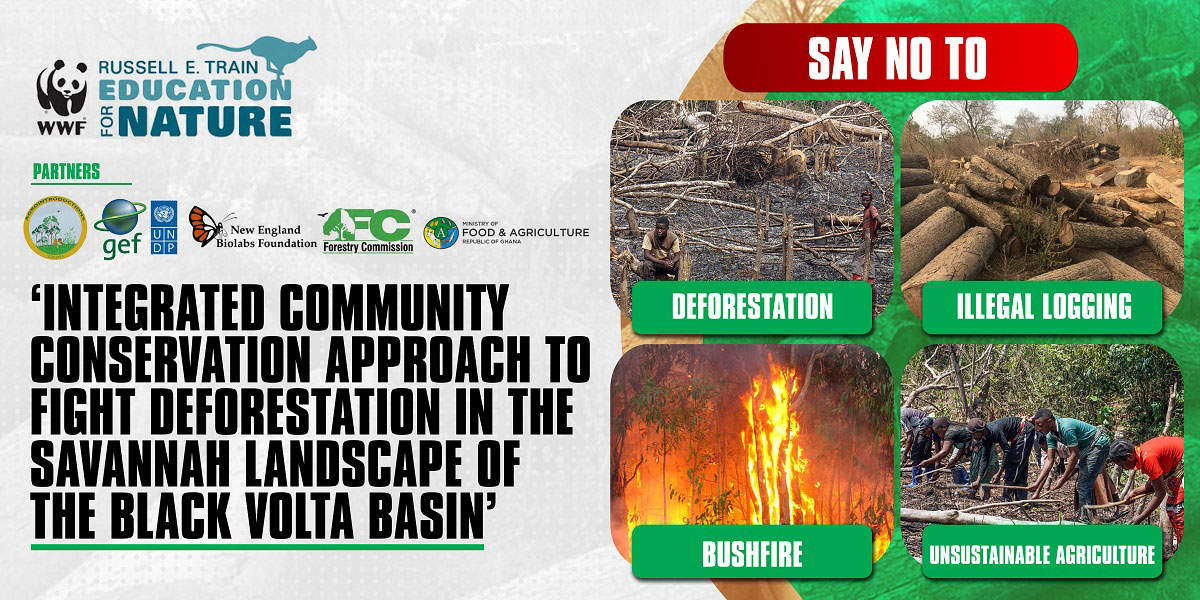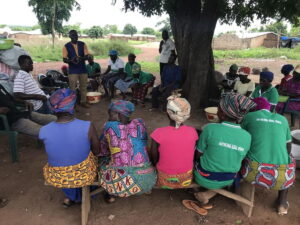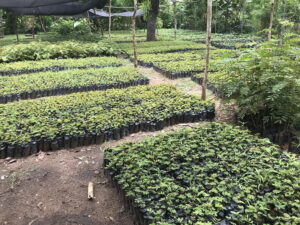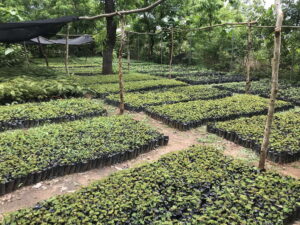
Project: Integrated Community Conservation Approach to Fight Deforestation in Bole, Ghana
Agrointroductions Ghana, through the funding support of WWF Russell E. Train Education for Nature Program (EFN) is implementing a savannah forest restoration project titled; ‘Integrated Community Conservation Approach to Fight Deforestation in Bole, Ghana’. Local partners such as the Forestry Commission, UNDP GEF of Ghana and the Ministry of Food Agriculture (MOFA) and the traditional authorities in Bole district are key stakeholders for the project implementation and sustainability.
The northern savannah zone is a fragile ecosystem sensitive to the effects of climate change. It is also a region undergoing rapid deforestation and forest degradation including the loss of valuable shea trees. According to Ghana’s forest reference level report, the savannah landscape has lost 77% of its forest cover between 2001 and 2015, causing the removal not only of environmental services but also economic products (e.g. shea kernels and charcoal) that have acted as both a cornerstone of the economy and as a critical safety net for the poor.

The drivers of this change include conversion to agriculture (at just under 40,000 ha per annum), in particular a transition from traditional bush fallow agricultural systems to more expansive machine ploughed and continuous cropping agricultural practices; logging; wood fuel harvesting and charcoal production; and mid to late dry season fires. These have resulted in extensive forest degradation, much of it severe. 100,000 ha per annum have fallen below 15% crown cover and have been reclassified as grassland areas. The loss of forest cover results in a more abundant growth of grasses, which, in turn, result in more intense fires in the dry season, frequently causing further degradation and deforestation and preventing regeneration of forest areas already impacted by other drivers. It is estimated that, 1,058,492 hectares have been deforested resulting in emissions of 3,568,400 tCO2e per year from the savannah landscapes of Ghana.
Growing deforestation and removal of trees renders in turn agricultural landscapes increasingly prone to desertification and land degradation which are exacerbated by the effects of climate change. Desertification, climate variability and food security are closely linked through drought, land cover changes, and climate and biological feedbacks. Women and men farmers interviewed by Agrointroductions Ghana in the Bole district perceived that rainfall had been decreasing, temperatures increasing, and bush fires, droughts and floods more prevalent.
The project targets three main drivers of deforestation within the area namely, small-scale shifting agriculture, illegal logging, and commercial charcoal production. The issue of small-scale shifting agriculture will be resolved through migrating farmers onto a sustainable intensification pathway. Farmers will be supported to adopt regenerative agroforestry practices in a bid to promote forest restoration. To address illegal logging, a Community Resource Management Area committee will be formed in collaboration with the Forestry Commission and their capacities will built to enforce forest regulations at the local level. The project will initiate the establishment of community woodlots to reduce the pressure on the fragile forest for fuelwood.


The project which is scheduled to run for 10months period was officially officially launched in Bole district district on 10th April 2022 in collaboration with local partners, traditional leaders and stakeholders from the project area. Urgent measures needed to restore the degraded savannah landscape and biodiversity loss in three (3) selected communities in the bole district along the black volta basin; have been initiated to improve social and environmental resilience and provide real economic benefits for inhabitants in the area. Regarding the short-term and long-term strategic outcomes of our project, key restoration and nature based solutions (agroecology, agroforestry, conservation agriculture, etc) interventions on site would contribute to enhancing forest carbon stocks across the landscape by 1) restoring 485 hectares of off reserve and on- reserve savannah forests/woodlands and place them under community management in Community Resource Management Areas (CREMA); 2) Improving knowledge and build capacity and conservation awareness among communities within the landscape to solicit collective community support for the project. and; 3) implementing and train farmers on an integrated climate smart agriculture and agroecology models to address food security and boost their rural economy.
Additional strategic benefits of the project from our ongoing training and education activities on climate change, agroforestry and agroecology, biodiversity conservation include;
- Over 200 farmers improving capacity to adopt and utilise sustainable agricultural practices that improve crop yields and sustain ecological integrity.
- Organised four (4) monthly community conservation education among students and youth groups is promoting behaviour change; and creating a trainer of trainers effect where participants continue to advocate for conservation among their peers, families, and communities.
- Over 100 Fuelwood producers learning and adopting the use of efficient carbonizing kilns that reduces wastages. Adopting woodlot production initiatives to ultimately eliminate extraction from fragile forests in the long-term.
- Training programs shifting mindsets, attitudes and behaviours regarding unsustainable forest extraction, especially among loggers. The training is helping elicit sympathy for nature conservation and the protection of flagship wildlife and plant species.
- Creating and empowering Community Resource Management Area committee to ensure the local management and enforcement of forest regulations to achieve conservation goals of the project over the long term.
We would like to thank WWF Russell E. Train Education for Nature Program (EFN) for providing the financial support to carry out the project. We are also very much indebted to the Traditional Authorities, Forestry Commission (Bole district) and Local Government for their continuous support for the project. We would like to thank the Ministry of Food and Agriculture (MOFA) Bole district for providing technical and staff support for the project. Similarly, we are thankful to the executive committee of the established CREMAs and district assembly for the support and showing promising future of project sustainability. We would like to thank all the forest managers, community members, community school managements, and all project volunteers involved directly and indirectly in the project activities. Finally we are thankful to all the project staff of Agrointroductions Ghana and partners for providing support at all levels of the project activities so far.

No Comments